Cerebral Palsy: Keith's Story
Apparently, having cerebral palsy makes me different.
I've had cerebral palsy since birth and I'll have it until I'm old and gray. There isn't a day that I'm not reminded I have the condition. And there never will be a day I won't have it. But in my mind's eye, life is good: If anything, cerebral palsy has made me a stronger, more humble person. I can even say having cerebral palsy has contributed to my success.
Cerebral palsy — CP for short — is a condition caused by injury to the parts of the brain that control our ability to use our muscles and bodies. Cerebral means having to do with the brain. Palsy means weakness or problems with using the muscles. Often the injury happens before birth. Sometimes it happens when a baby is being delivered or soon after being born. CP can be mild, moderate, or severe.
I'm in college now. As a teen with CP it was easy for me to get overlooked, discouraged, or even patronized simply because I wasn't considered "normal." This became especially apparent when doctors began prescribing "special devices" to help me re-establish or maintain a "suitable range of motion." These devices were to be worn while doing everyday activities, including school-time activities.
Because my CP mostly affects my legs and the way I walk, I had to wear knee-high, white-plastic, custom-made leg braces at all times during my first couple of years of high school.
Laced with Velcro, these braces locked my ankles and heel cords in a fixed position. Needless to say I hated those braces! They were painful, noisy — thanks to the Velcro and cheap plastic — and they seemed to broadcast that I was "crippled" (my skin crawls when I hear that word).
Fortunately, I have a very mild case of CP, and only my walk is affected. My hamstrings and heel cords are spastic (meaning they might twitch or spasm on their own and I can't control them) or tight. This causes me to walk bent-kneed and on my toes.
For people with more severe cases of CP, all aspects of their physical abilities — and sometimes even mental abilities — can be limited. I was fortunate that my legs were only slightly affected, which allowed me to participate in gym, school sports, and marching band. I was even bold enough to take part in school productions and plays.
I'm Rubber and Bullies Are Glue
As mild as my case of CP may be, there were always the high school bullies who found pleasure in bringing me down. Sometimes it felt that the only reason they were in school that day was to be my rain cloud, following me around pointing out my mistakes and flaws.
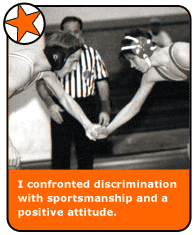
My bullies were girls as well as guys. They weren't physically threatening. They were the kind who hurt with words or by forcing an embarrassing situation, constantly looking over a shoulder for supporting chuckles from friends. However, my bullies normally found themselves laughing alone, because I'd already beaten them to the punchline. I was well liked, so the joke was on them. The reality was they had a lot of catching up to do.
A bully can't compare to what you put yourself through mentally. Just entertaining the thought that you're not the same as everyone else can work against anyone, even when you know you're above the norm in so many ways. During school, I never wasted time worrying what other people thought of me. I mostly worked on staying positive and meeting my own standards and expectations.
But there were times when people really got to me — their harassing, hurtful words began to penetrate. A couple of times, I even caught myself thinking, "What if they're right?" I found this the hardest place mentally to pull myself out of. But I told myself what I knew to be true: "You're the one who’s right! It doesn't matter what they think, you know you're better than them simply because you don't resort to acting like them. They are making you feel like an outcast so that their pitiful lives don't look so worthless after all."
As a teen, most of our time is spent in school. I found it didn't do any good to avoid the people who put me in these mental dark places. Instead, I worked on beating them to the punchline, turning the joke on them. This helped me develop a great life skill: the art of the witty comeback.
Dating for Dreamers
Having CP and dealing with bullies is a breeze compared with dealing with the anxiety of asking your first crush out on a date!
To me — and lots of guys! — high school girls seemed unpredictable and hard to figure out. The only thing I could do was be likeable, engaging, and responsive. The hardest obstacle to overcome was starting the first conversation. A lot of guys think they don't have anything interesting to talk about. This is where having CP came in handy!
When I was in ninth grade, there was a girl I liked who happened to be in all my classes. Soon, I got noticed and curiosity got the best of her. She was forced to ask the question that was on her mind for some time, "What's wrong with your legs?" These weren't the most romantic words to start a relationship, but it got my "foot in the door."
When most guys are struggling for the attention of the girls they like (by making fun of people like me!), I have the advantage because people are naturally curious, and all I have to do is smile. I was responsive to the girl I liked, so it made it easier for her to talk to me, even if the ice-breaking question was a bit embarrassing.
Don't count yourself out when it comes to dating. People will like you for who you are — that's it!
Spastic About Sports
The same theme of having a positive attitude and a willingness to try can be applied to cerebral palsy and sports. I played many sports while I was in high school, but I was best at golf. Go figure: the one sport that requires balance and precision — two weapons that aren't readily available in my arsenal. But I really excelled at golf.
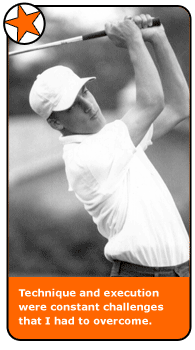
My doctor explained how I was able to participate — and achieve — as well as I did in sports, particularly golf: It's possible for some people with CP to learn how to get our bodies to work in other ways. In my case, I figured out how to use different back, arm, and leg muscles to mimic the techniques of the golf swing, instinctively adapting to my body's limitations.
I would have never known that my body was able to adapt like this if I didn't have the courage to try to play. I knew that I might fail, but I also knew that there was a greater possibility I'd have fun. I wasn't afraid what the other members of the team would think of me, because by this time my reputation and positive mindset preceded me. I say this because I want to stress the importance of staying positive about CP — or any physical condition — and not think of it as a limitation.
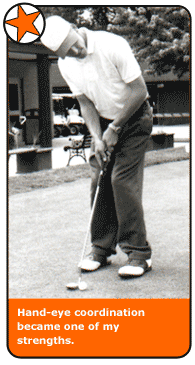
In my experience, people tend to admire you most for trying. They want to see you succeed, sometimes more than succeeding themselves. Four years of varsity golf was one of the highlights of my high school career and some of my best friends in school played golf.
I also participated in wrestling, working up to competing on the varsity level as well. Although I wasn't the best, I kept with it and tried my hardest. My body adapted its own techniques, like in golf.
In my case, participating in as many physical activities as possible was the best way (other than physical therapy or occupational therapy) to combat CP. Exercise keeps the affected muscles loose and limber, which helps to counteract the appearance of cerebral palsy.
Marching to the Beat of a Different Drummer
"Life is not about fitting in; it's about standing out." I don't know who originally said that, but it became my mantra when I joined the marching band. That's right: Keith, the guy writing about walking funny, joined the marching band as a freshman in high school.
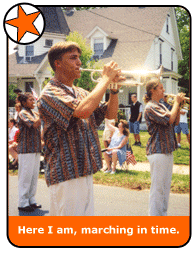
Why? I really enjoy playing instruments, and in my high school, if you wanted to be in any band, you had to join marching band. It was a requirement: If you didn't join marching band, you couldn't play at all.
That's how I found myself standing in the middle of a football field, trying out for the only high school sport where judges strictly critique the way you walk — no pressure there!
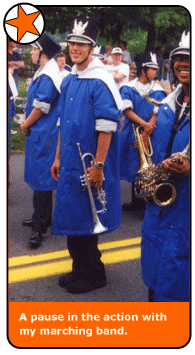
Being a member of a nationally recognized marching band is one of my more significant high school accomplishments. Although I can't say for sure how much harder it was for me than the rest of the band to keep step and pace while maintaining musical integrity, I can assure you that wrestling doesn't even come close to being as physically demanding.
Imagine standing on the 50-yard line of a football field as proud and as tall as physically possible while holding a 5-pound instrument up to your face. The conductor is counting 1-2-3-4-1-2; you're marching in time. Now put yourself in my position: Imagine doing this with a large rubber band wrapped around your knees — but still maintain your form, remember all your notes, project your sound high…left foot…right foot…backward, forward, sideways…LOUDER. You can't make any mistakes, because the judges see everything. I bet you can see why I stuck with it for 9 out of 12 months for all 4 years of high school!
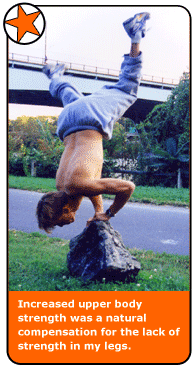
The message here is, don't get discouraged by your physical limitations. There is no physical way that my marching technique was anywhere close to being technically sound, but I tried my hardest, and I never gave up. Over the 4 years, my marching band and I won numerous regional and state level championships; in this case it wasn't so bad to "stand out."
Whether I'm winning or losing, young or old, I will always have CP. That will make me different from everyone else, but it is up to me to decide how differently I present myself. For me, CP is not an excuse for bitterness or negative actions, but more of a reason to better myself or an excuse to try harder and be more successful.
Life can be funny, so why not beat it to the punchline?
Note: All information is for educational purposes only. For specific medical advice, diagnoses, and treatment, consult your doctor.
© 1995-2024 KidsHealth ® All rights reserved. Images provided by iStock, Getty Images, Corbis, Veer, Science Photo Library, Science Source Images, Shutterstock, and Clipart.com

